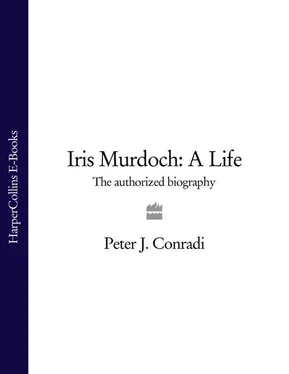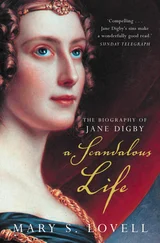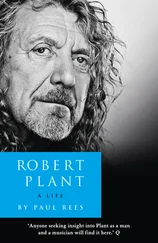A Life
PETER J. CONRADI

For John Bayley and for Philippa Foot
Cover
Title Page IRIS MURDOCH A Life PETER J. CONRADI
INTRODUCTION
I INNOCENCE Fairy-Tale Princess 1919–1944
1 ‘You ask how Irish she is?’ 1616–1925
2 No Mean City 1925—1932
3 The Clean-Cut Rational World 1932—1938
4 A Very Grand Finale 1938–1939
5 Madonna Bolshevicka 1939–1942
6 This Love Business 1942–1943
7 ‘A la Guerre, comme à la Guerre’ 1943–1944
II INNOCENCE LOST Storm and Stress 1944–1956
8 A Madcap Tale 1944–1946
9 Displaced Persons 1946–1947
10 Cambridge 1947–1948
11 St Anne’s 1948–1952
12 Franz Baermann Steiner– 1951-1952
13 Conversations with a Prince 1952–1956
14 An Ideal Co-Child 1953–1956
III INNOCENCE REGAINED Wise Child 1956–1999
15 Cedar Lodge 1956–1961
16 Island of Spells 1961–1965
17 What a Decade! 1965–1969
18 Shakespeare and Friends 1970–1978
19 Discontinuities 1971–1978
20 Icons and Patriarchs 1978–1994
21 ‘Past speaking of 1994–1999
NOTES
SELECT BIBLIOGRAPHY
INDEX
About the Author
BY THE SAME AUTHOR
AFTERWORD
Copyright
About the Publisher
Iris Murdoch wrote to her friend the painter Harry Weinberger in October 1985, when he was contemplating writing his memoirs, ‘how precious the past is, how soon forgotten’, regretting how little she had researched her own family. She told her old refugee-camp friend Jože Jančar in about the same year to expect a call one day from her biographer. When ‘feeling mortal’ in 1963 she had sent some poems to her publisher at Chatto & Windus, Norah Smallwood, explaining, ‘I would like one or two of these poems to have a chance of surviving.’ 1She lodged a story, her family tree and her husband John Bayley’s Newdigate Prize poem with her literary agent Ed Victor in the 1980s. How she was remembered mattered: she once startled a Jesuit student who had quoted St Augustine by asking, ‘Have you any evidence that he was a good man?’ She kept in London a copy of H. House’s Sketches for a Portrait of Rimbaud, and a well-thumbed Life of Shakespeare by A.L. Rowse. She encouraged Stephen Gardiner in his biographies of Jacob Epstein and Elisabeth Frink.
The idea of a biography of her was first mooted by the publisher Richard Cohen. 2At first appalled, she later consented to her friend A.N. Wilson writing it, and Chatto showed interest in commissioning the book as a Socratic dialogue. At some point in their researches, after 1990, both she and Wilson cooled to the idea. Probably Dame Iris wanted only intellectual biography, at least during her lifetime, though she was resigned, as she told the American biographer Jeffrey Meyers, to the matter being resolved after she had ‘departed this scene’. I raised the issue at the end of 1996, the year when Iris and John Bayley and my partner Jim O’Neill and I had started to spend weeks together in Radnorshire. It did not seem right that the life of so remarkable a person should go unrecorded, and I hoped that it would be written by someone sympathetic.
I had loved her work since finding The Bell in Oundle school library around 1960, and thought, like tens of thousands, ‘These books are about me.’ I wrote my Ph.D. on her Platonism (later published as The Saint and the Artist: A Study of the Fiction of Iris Murdoch), and we met at a lunch party in 1981 to celebrate her honorary doctorate from the University of East Anglia. Eighteen months later, listening to her give the ten Gifford lectures in natural theology over a fortnight in Edinburgh, and argue that the good man literally sees a different world from the mediocre or bad man, I was shocked into a new way of thinking. We met again, and I discovered I was a Buddhist. (Talking to her old Oxford contemporary M.R.D. Foot about Iris’s converting Frank Thompson to Communism in March 1939, we decided she was always a collector of souls.) This interested her. John Bayley’s Iri s: A Memoir of Iris Murdoch (US title Elegy for Iris) suggests I taught her about Buddhism; at first she taught me. * We met for lunch, once or twice a year, often at Dino’s in South Kensington. She liked the first-floor restaurant, where there were sometimes no other diners: despite her partial deafness, she could hear there. On one such occasion, having just learnt to stand on my head in a Hatha-Yoga class, I offered to demonstrate. She declined, but put the incident into The Good Apprentice, when Meredith stands on his head for Stuart. She was appalled to learn that there were Tibetan teachers who had love affairs with their students. She said fiercely, ‘I have committed many sins, but never that one,’ referred to it in The Message to the Planet, and introduced me to her friend Andrew Harvey, who had recently written the Buddhist-inspired A Journey in Ladakh, whom I think she hoped might wean me from my teachers. In 1988 she invited me to join her and John for Christmas lunch, but this invitation came unworkably late (Christmas morning). She attended a seminar on her work in 1989 at Kingston University, where I taught, and Kingston awarded her an honorary doctorate at the Barbican in 1993, where she gave away degrees. She sent me as a gift a typescript liberally annotated in her hand of her radio opera The One Alone, 3 and after I had completed a three-month Rocky Mountain group meditation retreat came to dinner, to witness, perhaps, any effects. One was that, though no one has influenced me more, she alarmed me less. I lent her Heidegger’s volumes on Nietzsche for her work-in-progress; discussed her work with her at symposia: in 1987 at the Free University of Amsterdam, in 1992 in Alcala de Henares in Spain, in 1994 at the Cheltenham Literary Festival. Around 1992 she put my and Jim O’Neill’s blue-eyed collie into The Green Knight as Anax, which involved meeting and much conferring about detail. That we lifted the dog up interested her and made its way into the text. When I read the proofs, I wrote to her as if from the dog, suggesting emendations I was not sure a non-canine critic might effect. She replied (to the dog, whose influence exceeded that of Chatto editors) implementing the changes. In 1997 I collected her essays, which Chatto published as Existentialists and Mystics. Although the four of us became from 1996 until her death like ‘family’, I had the not uncommon sense of not knowing her, and was astonished to learn that in her will she had left me a Gandharva Buddha and a bequest and, although an inveterate destroyer of letters, had kept a number from me about Buddhist matters.
The matter of a biography rested until the summer of 1997, when I asked Iris how she felt about it, and she replied, ‘You’re a good friend.’ We made cassettes together. She enjoyed helping, gave affirmative character references –? tip-top person’, ‘A splendid woman'; advised reticence on one (unimportant) matter. She was thrilled when introducing her old friend Philippa Foot and hastened a meeting with her brother-in-law Michael Bayley. As late as 1998 she identified her grandmother and first cousin Cleaver from photographs, and her response to three beloved names – Franz, Frank, Canetti – endured. Of the third she remarked in May 1997 with poetic ungrammaticalness, ‘His name shudders me with happiness.’ As she gradually forgot her past, I rediscovered it. It sometimes seemed as if I were becoming her memory. There was something magical, and humbling, about revivifying someone so richly and intensely endowed with life. To her Oxford contemporary Leo Pliatzky she wrote in 1946, ‘I’m glad I was born when I was, [aren’t] you? I’m sorry to have missed pre-war Paris, but Lord, this is an interesting age.’ 4
Читать дальше











